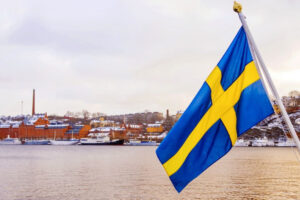
Sweden has announced that it will provide Ukraine with $200 million in direct budget support in 2026 to help meet the daily needs of citizens in the midst of the war, Ukrainian Foreign Minister Andriy Sybiga said.
“This funding will meet the daily needs of people in the midst of war, including critical public services, energy supplies, healthcare, schools, pensions, and other payments. We are deeply grateful to Sweden for its determination, support, and unwavering solidarity,” Sibiga said in a post on social media on Saturday.
According to him, Sweden has shown leadership from the very beginning: in August, it became the first country to provide Ukraine with $75 million in direct budget support, and now it is reinforcing that leadership with an additional contribution.

The Law “On the State Budget of Ukraine for 2026,” which the Verkhovna Rada adopted on December 3, provided for an increase in expenditures to support the agricultural sector by almost 47% compared to the previous year, or by UAH 4.5 billion, to UAH 14.1 billion, according to the Ministry of Finance.
According to the report, the 2026 state budget provides for UAH 9.5 billion to finance subsidies per hectare for frontline territories, insurance of agricultural products, and UAH 0.2 billion of this amount for irrigation/land reclamation.
The 2026 state budget provides for support for farmers (loans, subsidies per 1 hectare, subsidies for cows, goats, and sheep) in the amount of UAH 2.6 billion. The government has allocated UAH 2 billion for the humanitarian demining of agricultural land.
In addition, the state budget provides for the replenishment of the “Affordable Loans 5-7-9%” entrepreneurship development fund with UAH 18 billion, the innovation fund with UAH 7.4 billion, and business support programs with UAH 4.9 billion to support business. UAH 1.9 billion and UAH 0.6 billion will be allocated to the decarbonization and energy efficiency fund, respectively.
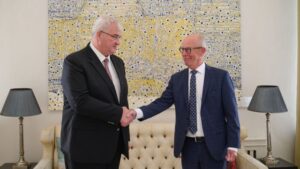
Ukrainian Foreign Minister Andriy Sybiga received Ole Egberg Mikkelsen, Ambassador Extraordinary and Plenipotentiary of the Kingdom of Denmark to Ukraine, who is ending his diplomatic mission in Ukraine after five years of service.
According to the press service of the Ukrainian Foreign Ministry, Sibiga expressed his gratitude to Ole Egberg Mikkelsen for his personal commitment to the Ukrainian-Danish partnership and noted that the ties between Ukraine and Denmark established during his tenure go far beyond official relations.
“Denmark has become a world leader in terms of aid to Ukraine as a percentage of GDP (2.89%) and has provided our country with more than €9.9 billion in support. In addition, Denmark’s unique partnership with Mykolaiv and the Mykolaiv region has become a model of regional cooperation for other international partners. We greatly appreciate this,” Sibiga said.
The minister also noted the recent launch of the long-term humanitarian support program Ukraine Transition Programme and unprecedented military assistance, namely Denmark’s transfer of its entire artillery arsenal, the provision of F-16 fighter jets, and the launch of the Danish model of direct investment in the Ukrainian defense-industrial complex.
The interlocutors discussed the further development of relations between Ukraine and Denmark on the path to a just peace and the restoration of security in Europe.
The Foreign Minister wished Ole Egberg Mikkelsen success in his new endeavors.
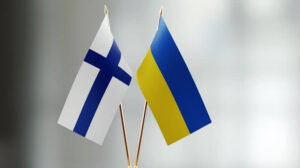
Finland has announced a new package of military assistance to Ukraine worth approximately EUR143 million.
“Finland continues to provide strong support to Ukraine. The new support package includes the first tranches of a €660 million order program from Finnish defense companies,” Defense Minister Antti Hakkänen wrote on social media site X.
He emphasized that with this support program, Finland is helping Ukraine defend itself.
According to a statement on the Finnish Defense Ministry’s website, a new aid package to Ukraine worth approximately EUR143 million is currently being prepared for approval by the Finnish government and president.
To date, the total value of defense equipment supplied by Finland to Ukraine is EUR2.8 billion.
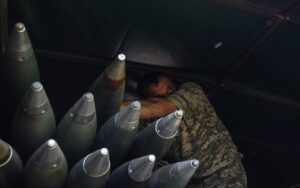
The Czech government is seeking support from other European Union countries for a new ammunition initiative after implementing a similar initiative in 2024, German N-TV reports.
“This is a matter of political will, and if many EU member states rejoin our initiative, we can achieve a lot for Ukraine,” Foreign Minister Jan Lipavsky said in an interview with the German news network (RND).
“We are currently looking at how we can finance the new ammunition initiative, and then we will see how many rounds of ammunition we can get for this money,” the Czech foreign minister added.
As reported, Defense Minister Jana Černohová announced the second project to purchase ammunition for Ukraine under the working title Initiative 2025 back in July last year. Deník N reported at the time that five companies would participate in the project: Czechoslovak Group, STV Group, Omnipol with Ompo Holding, Colt CZ Group SE, owned by Česká zbrojovka, and the DSS arms company.
Under the previous Czech ammunition initiative, Ukraine was provided with approximately half a million pieces of artillery ammunition. A total of 18 countries joined the initiative.
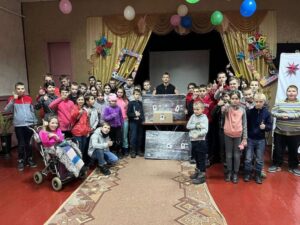
The “Hope and Unity” Charitable Foundation continues to actively support the Ohmatdyt Children’s Hospital. Thanks to caring Ukrainians and the support of the Foundation’s partners, we have managed to raise significant funds for the purchase of necessary equipment, medicines and materials.
This week, a modern lung ventilator was delivered to the hospital, which will help save the lives of the youngest patients. In addition, the foundation provided the oncology department with new beds and medical instruments. A recreation room with games and educational materials was organized for children undergoing long-term treatment.
“We understand how important the atmosphere in which children are treated is for them,” says PIB, founder of the ‘Hope and Unity’ Foundation. – “That is why we strive to create the most comfortable conditions for young patients and their parents at Okhmatdyt.
The “Hope and Unity” Foundation calls on all those who care to join the charitable cause and support the Okhmatdyt Children’s Hospital. Every hryvnia, every little thing matters and can save a child’s life.
How to help:
Together we can create a future for every child!
CHARITY, CHILDREN, DISEASE, foundation, HELP, Hope and Unity, SUPPORT, ОХМАТДИТ